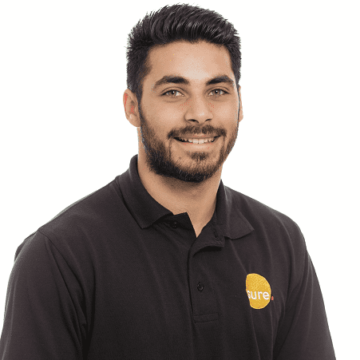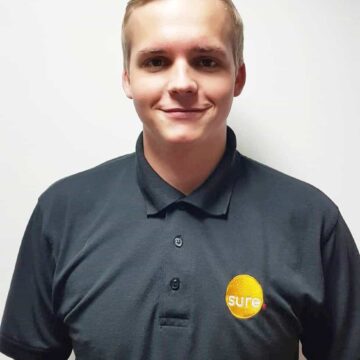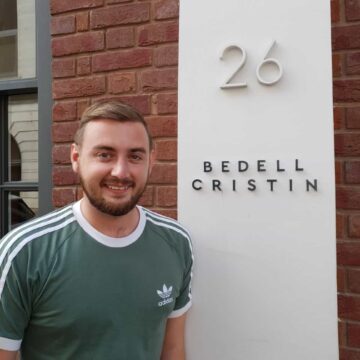From designing equipment such as routers, switches, multiplexers, and other specialised computer/electronics equipment to maintaining computer networks and hardware, a technical engineer is the backbone of an organisation’s technology systems.
Eduardo Wilson – Sure
What do you do?
I’m a network engineer which involves mobile, splicing, testing, circuits and testing remotely. Mobile engineering involves going out to the site and installing equipment as well as site maintenance.
What training have you undergone?
I did three years at Highlands College studying IT, I completed my Level 2 and 3 in the BTEC Extended Diploma in IT.
Skills you need for the job?
Problem solving skills, take pride in your work ethic and determination (things don’t always work in the engineering world, even for the engineer!).
Career prospects:
In the near future I look to pass all my relevant courses that come with the mobile engineering world ie. climbing course. I also look to gain a substantial amount of knowledge based around the mobile engineering world, as well as other key areas. This will be alongside my colleagues and a lot of hands-on work.
Advice for job seekers in the same field:
Even if you’re not qualified enough for the job, still make an effort to apply for it. The worst they can say is no. Once your foot is in the door, that’s when you start to learn and pick up all the tricks of the trade. Presentation is everything!

Morgan Franklin – JT
What do you do?
I work within the core technical areas such as networking and software services, alongside a highly skilled team of technical professionals focused on diverse areas within the business. My role allows me to rotate around the technical sections gaining first hand practical experience and learning from experts in the areas that I hope to one day specialise in.
What training have you undergone?
After leaving school I studied at Highlands College for 2 years, gaining a level 3 BTEC qualification in ICT. My first year covered generic ICT and in my second year I majored in Security, Networking and Web Development.
Training and development on the job?
As I have just started I haven’t undergone any technical training yet however I hope to take some courses such as Network+ and possibly a degree once I have found my ideal area within the business. The apprenticeship allows you to work within many areas of the company and experience first-hand what it is like to do certain tasks that you may not have any experience in or may have shied away from before. I look forward to being able to advance my skills and gain qualifications while working and earning.
Advice for job seekers?
Just be honest; employers enjoy creative, passionate, positive and motivated individuals. Don’t hide who you are and if you have questions, don’t be afraid to ask. Be ready for change and prepared to adapt. If you’re looking to go into an apprenticeship, then just be aware that things may be different compared to what you’re used to; employers want you to learn and work hard at the same time, not only improving yourself but also to allow you to be involved within the company and fit into working life.

Peter Lescop – C5 Alliance
What do you do?
I work within the technical solutions team, focusing on security and networking.
What do you do on an average day?
Mostly I work with clients to make technical recommendations covering various security risks. My time can be spent fulfilling these recommendations in projects, which can often be in conjunction with various teams within C5. I also provide support for clients network and security infrastructures from firewall changes to troubleshooting network issues.
What training have you undergone?
Most of my training has been on the job and self-study. I have various Microsoft certifications, including MCSA: Office 365. I also have a background in networking and have obtained my CCNA. My most recent training has focused on security, getting certified with various Sophos products and services, along with the CompTIA Security+ certification.
Training and development on the job?
This often takes the form of self-study towards various certifications. It’s also important to familiarise yourself with products and services on the job by deploying them on your own test environments, most products have free trials-use them!
Career prospects?
Security is one of the faster growing sectors within the IT Industry. It is also a very broad area of IT, with a vast array of roles available, from pen testing to architecting secure networks. We live in a world that is becoming more connected every day and security needs to play a role in that as it develops.
“Security spans across the business and isn’t just an “IT” issue. The ability to clearly & effectively communicate across all levels of an organisation is a brilliant skill to have.”

Dillon Walker – Sure
What do you do?
I work in Sure’s service operations centre (SOC) which is 24×365. We use monitoring tools to support Sure’s network and enterprise customers. Responding to all service interruptions or performance degradation. Ensuring incidents, problems, changes and requests are resolved efficiently and correctly across all Channel Islands & Isle of Man networks and infrastructure. We also provide Level 1 and Level 2 Mimecast Support for offshore customers.
Skills you need for the job?
Educated at GCSE level with good pass results. Having an IT related qualification is desirable. Other key skills to have are good written and verbal communication, customer service skills, using your initiative and being self-motivated.
Training and development on the job?
We have SOC related workshops on subjects such as incident management to improve and develop knowledge within the SOC. Alongside this when I joined I shadowed my peers. During my time in the SOC I’ve had ITIL, First Aid & Mimecast training and certifications. In addition to this, the SOC is presently undergoing a digital transformation to improve the way network and service operations is conducted. This includes the upskilling of SOC personnel, introduction of industry best practice processes based on the ITIL framework and the implementation of new best in class tools and systems. This will increase customer satisfaction, increase profitability and efficiency while at the same time improving the working environment for the team.
Career prospects?
I’m always looking to progress my career and I’m aiming to become specialised in networking at a very technical level, for this to be possible I need to focus on getting the suitable professional qualifications such as CCNA and CCNP but also by getting experience and exposure by working in related roles.
“Learn about the company and their core values, what services they offer, where they operate and always be a team player!”

Sacha Serinet – Touchstone
What do you do?
I am an application support engineer for our NavOne solution. I also have responsibility for coordinating the support desk report crimes etc.
What do you do on an average day?
I manage support requests from clients all over the globe. This will involve collecting information around application issues, maintaining client support queues and feeding back resolution to clients. I’ll be liaising between our business consultants and software developers to recreate, identify and fix issues within the application. I’ll also be contributing to testing efforts of application fixes before they are delivered to the client. Occasionally I am also involved in the technical writing and updating of user manuals for our NavOne solution.
Skills you need for the job?
Although official qualifications are important, it is more important for an individual to possess an inquisitive mind and a technical way of thinking. You will also be genuinely interested in resolving issues and be confident in speaking to a multitude of stakeholders across different jurisdictions and different cultures.
Training and development on the job?
Being an application support engineer requires a lot of training on the job. You are constantly learning about new areas of the application, the architectures it relies upon as well as how technology is shifting. I am not a developer however I have had to learn over time how to read code and more importantly how to effectively use the debugger, understand coding concepts as well as communicate effectively between technical and non-technical stakeholders.
Advice for job seekers?
I was educated at De La Salle and originally may have felt that a career in the digital sector was not possible in Jersey – I would advise job seekers in this field that there are many opportunities out there and actually starting in a role in application support can be a great way to learn a lot across a lot of areas within the business.

Alex Snape – Touchstone
What do you do?
My role involves overseeing the technical elements of new implementations, projects and work requests. I send out work allocations and jointly manage and mentor the team of developers. I also form part of the CI management team which oversee the running of the business.
What do you do on an average day?
Over the last 10 years I’ve specialized in implementations and migrations. I therefore get heavily involved in projects which I’m actively the lead in or mentoring the other developers on their projects. I’m often onsite somewhere working closely with the client which I love doing. On a daily basis I manage the development work queue. This involves understanding each request and reviewing requirements with the business consultants. These then have to be allocated to the appropriate developer.
Training and development on the job?
There are many MS Dynamic Courses out there to learn about core and new features a like. We also send our managers on management courses to help them develop those skills. Each year there is a Dynamics NAV Conference which we attend (NAV Techdays). It’s run by the developers at Microsoft rather than salesmen and you get a great raw insight into what’s coming up. You can also have lab sessions and speak to them in the intervals (and a beer afterwards). Really worth attending.
Advice for job seekers?
It’s not all about the qualifications and how many Microsoft certificates you have on the wall! These will certainly make the CV look good, but if you have poor communication and people skills you’ll easily be overlooked during interview. Managers will be looking for confident, team players and people that are a fit to the company’s philosophies and ethics.

Matt Derrien – Logicalis
What do you do?
I am a Security Specialist working for Logicalis Jersey’s security division. I am a member of the Networking and Firewall team within the security department and my main role in the team is to monitor and manage firewalls for our customers. I also help out with the management and monitoring of our inhouse network for Logicalis’ security department.
What training have you undergone?
After my A-Levels I went to Bournemouth University, where I obtained a degree in Forensic Computing and Security. During my degree I had a placement year with Logicalis in the security department. During this year I worked in the SOC (Security Operation Centre) team, and my main roles were with endpoint encryption and Infrastructure. After my degree, I joined
back with Logicalis this time in the Firewall and Networking team.
What do you do on an average day?
My main priority is working with world leading hotel operators and the management of their firewalls. On an average day I am usually dealing with change requests for our customers on implementing a new firewall.
Advice for job seekers in the same field:
Make employers aware that you are very keen on this field and that you are a very willing learner and you’re not afraid to help out on anything within the business.
“Make employers aware that you’re very keen on this field and that you’re a very willing learner.”

David Conlon – JT
What do you do?
Design networking solutions for new and existing enterprise customers including WAN, LAN and WiFi networks. This includes attending client meetings to review customer requirements then pricing and documenting our proposed solution. In addition to this I assist on the detailed design and sometimes implementation for certain projects once a solution has been accepted by a customer.
What do you do on an average day?
A normal day involves meeting with clients to review their business requirements and future strategy in regard to networking. From this I create a proposed network solution that includes the technologies and equipment used to provide a platform that suits the clients needs. This solution is then priced and documented in the form of a proposal which is sent to the customer for review.
Skills you need for the job?
Relevant vendor qualifications such as CCNP and experience in the networking field.
Training and development on the job?
There are many Cisco qualifications that cover various aspects within networking such as Routing and Switching, Wireless, Security, Data Center and Design. The diversity of customer requirements allows me to work on solutions containing aspects from each during my time at work which assists with building a knowledge of these for a certification.
Advice for job seekers in the same field:
Spend as much time working on equipment as you can to help build your knowledge and understanding of different technologies.
“Work on different things as much as you can, everything new you do adds to your knowledge and will likely be good experience for the future.”

Tom Luce – Infuse Group
What do you do?
I’m the Technical Director and Infuse Group and I am responsible for the endto-end web application development process. Our Managing Director and I will collaborate to define a specification and then I’ll take that and execute it from a coding point of view.
What training have you undergone?
I’m entirely self-taught through a combination of online courses (both free and paid) as well as books.
What do you do on an average day?
Each day starts with a brief ten-minute meeting to discuss what everyone is working on, then I’m likely to put my headphones on and spend some uninterrupted time coding. Occasionally there will be pair programming or discussions concerning planning larger features from a design or architecture point of view.
Skills you need for the job?
A solid foundational knowledge of web development, specifically HTML and CSS as well as knowledge of a programming language, preferably Ruby (as our preferred technology stack is Ruby on Rails).
Advice for job seekers in the same field:
There’s no substitute for experience in the field of web development as there’s so much to learn. Sign up to blogs and try and read something about programming every day as it’s important to keep abreast of changes in the industry. In addition, the best way to prove that you have technical acumen to a prospective employer is to produce a web application that has publicly available code (e.g. on Github).
“Look at Team Treehouse for online course material. Get a bit of knowledge under your belt and find a personal project to get your teeth into.”

Scott Renouf – Bedell Cristin
What do you do?
I’m an ICT Systems Analyst, providing second line support to Bedell Cristin’s 170+ staff across six jurisdictions. I have been at Bedell Cristin for over five years working within the infrastructure team, my responsibilities include administering our various cyber-security solutions, Active Directory and group policy management, building, patching and maintaining Windows servers in a virtual environment, as well as investigating day-to-day issues escalated from the Service Desk. I also provide assistance with project work – most recently upgrading our Office suite and document management system.
What training have you undergone?
After finishing school I studied for two years at Highlands College, gaining a Level 3 BTEC Extended Diploma in ICT. This gave me the opportunity to study a range of areas including networking, web development, programming and security.
Training and development on the job?
Following a successful work experience placement through the Advance Plus scheme, I was offered a fixed term contract in the Office Services team. During my fixed term contract, I tried to prove myself to the business by demonstrating a can-do attitude and willingness to progress. After only a few months, a role as an ICT Helpdesk Junior was advertised, and following an interview, I was offered a permanent role.
During the last five years the majority of my training has been on-the-job and through self-study. When I worked on the busy service desk, I gained valuable knowledge & skills through working alongside a highly skilled team of professionals.
Career Prospects
I would like to continue to develop and progress within the infrastructure team. In the near future, I’m looking to make a start on MCSA: Windows Server 2016. I’ve also looked into CompTIA Security+ and would like to obtain that qualification too.
Advice for job seekers?
Be confident in your approach, and don’t let a lack of qualifications discourage you. IT Service Desk positions are a brilliant way to learn a vast array of skills and gain experience working in a professional environment. The fast-paced nature of the job means you’re always learning. Show employers you’re interested, eager and willing to learn.
